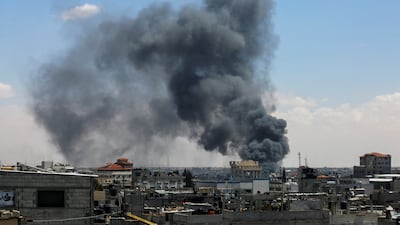Live updates: Follow the latest on Israel-Gaza
Hamas’s acceptance of proposals for a ceasefire in Gaza came as a result of pressure from mediators, the Israeli assault on Rafah and a nudge from its primary backer Iran to strike a deal, sources told The National on Tuesday.
After months of negotiations, Hamas agreed on Monday to a ceasefire proposal from Egypt and Qatar to stop the war in the enclave, shifting the decision into the hands of Israel, which has yet to announce its position.
The Palestinian militant group that has ruled Gaza since 2007 has fought five wars against Israel, the latest of which is by far the longest – now into its eighth month – and the most ruinous. Despite its relentless air and ground campaigns, Israel has not been able to eradicate the Iran-backed faction.
Hamas has long insisted on a permanent ceasefire and a complete Israeli withdrawal from Gaza to accept a ceasefire and release Israeli hostages it has been holding captive since it attacked Israel on October 7. But it has finally approved a text that calls for "sustainable calm" and a "stop to all military action".
Although Israel has yet to officially respond to the latest proposals, all signs suggest it will reject them on the grounds that they ensure Hamas’s survival.

“Gaza has mostly been reduced to rubble and Hamas needs reconstruction funds to secure its political survival and the support of its constituency,” one of the sources told The National.
“It [Hamas] agreed to the latest proposals because, besides being the closest to what it has long demanded, it wanted to secure the goodwill of the mediators when it’s time for reconstruction."
"They were under consistent pressure," said another source after Hamas accepted the proposals.
A UN report released last week said rebuilding Gaza’s shattered homes will take until 2040 at the earliest – but could drag on for many decades.
A separate report based on satellite images analysed by the UN found 85 per cent of Gaza’s schools had suffered some level of damage and 70 per cent would require full or major reconstruction. Health and other educational facilities have also been damaged.
Most of the funds needed for reconstruction are widely expected to come from Gulf Arab nations, including Qatar, a long-time financial backer of the Hamas government and home to the group’s exiled political leadership.
The Gulf nation faced mounting US pressure to push Hamas into accepting ceasefire proposals drawn up with support from American and Egyptian mediators. Sources said Doha made veiled warnings to the Hamas leaders based there that they would be asked to leave if they did not show flexibility during Gaza truce negotiations.
Israel's insistence it would sooner or later launch an offensive in the southern Gaza Strip city of Rafah to finish off what it claims to be the last of Hamas's combat battalions was an essential factor in the militants' decision, the sources said.
Israel has repeatedly declared the dismantling of Hamas’s military and governing capabilities as its foremost goal of the war, which was triggered by Hamas when its fighters rampaged through southern Israel in October, killing 1,200 people and capturing 240, according to Israeli tallies.
Rafah, on the Egyptian border, has for months served as a refuge for more than half of Gaza's population, who fled to the city to escape the fighting elsewhere in the enclave. Israel stepped up its military operations in Rafah on Monday and launched a ground and air assault.
Egypt was another area of pressure, according to the sources, using its ties to Iran – Hamas’s main foreign backer – as well as Russia and China, who have close ties to the group, to encourage them to nudge Hamas towards a deal.

The most populous Arab nation has a zero-tolerance policy at home for groups with an ideology the same as Hamas's. But it has, over the years, developed a close working relationship with the militant group because it views Gaza as an extension of its national security sphere where stability must prevail.
Egypt has also used its ties to Hamas to dissuade the group from spreading its radical brand of Islam in its territory. Egypt has for years been fighting an insurgency by militants centred in the part of the Sinai Peninsula bordering Gaza.
Accepting a deal, and thus ensuring its survival, Hamas can also keep at bay the Palestinian Authority based in the Israeli-occupied West Bank, which has been waiting in the wings, looking for an opportunity to regain control of Gaza.


